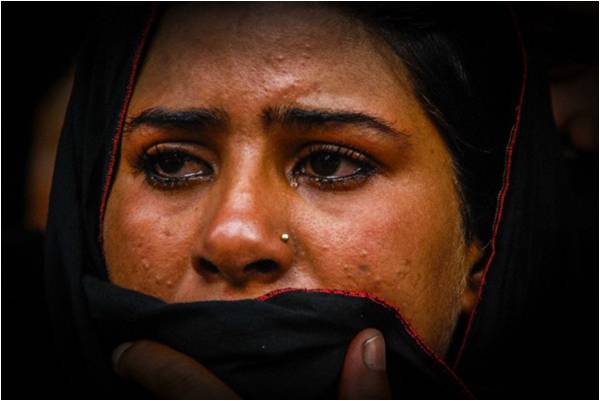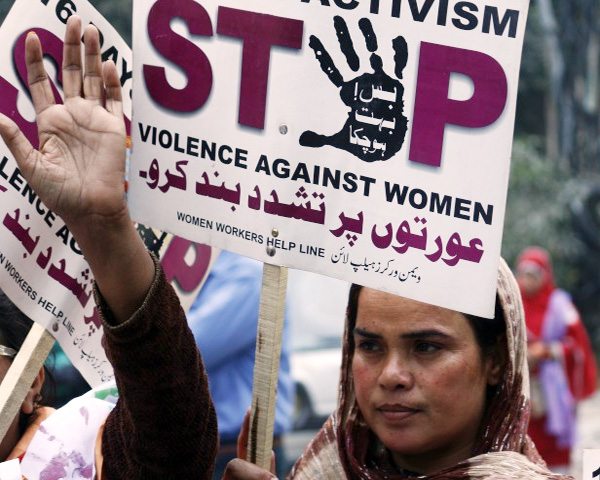
In their relentless tirade against the Punjab Protection of Women Act of 2016, the clergy has called it an attempt to undermine Pakistan’s social values. They say it pursues a western agenda to weaken Pakistan’s cultural and religious norms. A leader of one religio-political party went as far as saying that the law was a tool to make men subservient to women.
That reminds me of H Rider Haggard’s adventure classic She, which portrayed an authoritarian character of a charming white queen enjoying absolute power over her subjects in an imaginary Central African state. It was published on the eve of the fiftieth anniversary of Queen Victoria’s coronation, and deemed a tribute to the queen as an embodiment of female empowerment. “She-who-must-be-obeyed” was the core attribute of the character.
The critics of the new law think it will lead to the emergence of the hitherto-oppressed woman as a She in every house, and all men will be subjugated – a paranoia of an imaginary feminist revolt. That is obviously a far cry given our deep-rooted social realities. Even the chief of the Council of Islamic Ideology stepped in to rescue the male chauvinistic orthodoxy, saying the law was against Islam.
Despite the impending threat to its existence, the law has a very significant symbolic value, particularly at a time when a consensus has been developed among the state institutions and large segments of the society against all forms of extremism. The law signals a beginning of departure from the fundamentalist narrative, which was imposed on our society four decades ago and has now set in deeply. This legislation has sent a message of hope to oppressed women at a time when the achievements of Dr Nargis Malvala and Shermeen Obaid Chinoy have made Pakistan proud. In short, the law heralds a long-awaited process of social transformation.
For now, its utility may seem overrated. Centuries-old oppressive social customs will make it difficult for a majority of the victims of abuse to take a legal recourse. Women have been persistently told to accept gender-based discriminatory treatment as a reality of their existence. For many of them who have internalized the perception that they are inferior, it would be unthinkable to challenge male dominance in a court of law.
In the west, the economic emancipation of women after the industrial revolution accelerated their empowerment. Historian Will Durant says: “Now we cannot beat them anymore, they will not cook for us anymore, they will not even stay at home with us an evening.”
But in our patriarchal society, a large majority of women is economically dependent on men. Like many other ills that plague us, there is no shortcut solution to marital abuse and violence. Only a massive and protracted movement of social transformation can help change the society. Aware Girls, a Peshawer-based organization working for gender equality, conducted a survey whose findings give a glimpse of what men think of domestic abuse. Fifty-two percent of the participants said a husband could beat his wife if she disobeyed him. This shows the deep-seated notion of male superiority in our society. It is so firmly ingrained that not only the perpetrators, but very often the abused too, accept this as a social and religious privilege of men. Viktor Frankyl says in his acclaimed Man’s Search for Meaning that when suffering finds meaning, it ceases to be suffering. Persistent indoctrination of a husband’s divinely ordained right to physical and psychological abuse gives a majority of Pakistani women a reason to suffer in silence. And legislative measures may not be sufficient until social norms and cultural attitudes change.

Such a change will have to be engineered by gradually altering our socio-economic structures, through a collaborative effort of the state and civil society. As a starting point, the curriculum can be used, particularly during early school years, to impart moral education focusing on respect and equality for women in every social role. Women’s education is a powerful instrument, because it can help make them aware of their fundamental rights and the legal protections available to them. Encouraging women to learn skills and become entrepreneurs can help address their fears of economic insecurity, which ultimately enable a bread-earning man to exploit and abuse a dependent spouse.
The feudal notion of women as tradable commodities has been a major cause of gender-based abuse in many eastern societies. Equating women with other capital assets, such as land and wealth (as seen in the Urdu cliché Zan, Zar aur Zameen) gives a psychological affirmation to a man abusing his wife.
There are miles to go before women secure an honorable place both at home and in the society, but the legislation under attack is a step in the right direction. Those who are bitterly opposing this law may find solace in the fact that unlike Haggard’s She “who must be obeyed”, this is a struggle to give women a right to honorable life and equality, as a She who must be respected.
That reminds me of H Rider Haggard’s adventure classic She, which portrayed an authoritarian character of a charming white queen enjoying absolute power over her subjects in an imaginary Central African state. It was published on the eve of the fiftieth anniversary of Queen Victoria’s coronation, and deemed a tribute to the queen as an embodiment of female empowerment. “She-who-must-be-obeyed” was the core attribute of the character.
The critics of the new law think it will lead to the emergence of the hitherto-oppressed woman as a She in every house, and all men will be subjugated – a paranoia of an imaginary feminist revolt. That is obviously a far cry given our deep-rooted social realities. Even the chief of the Council of Islamic Ideology stepped in to rescue the male chauvinistic orthodoxy, saying the law was against Islam.
It is a paranoia of an imaginary feminist revolt
Despite the impending threat to its existence, the law has a very significant symbolic value, particularly at a time when a consensus has been developed among the state institutions and large segments of the society against all forms of extremism. The law signals a beginning of departure from the fundamentalist narrative, which was imposed on our society four decades ago and has now set in deeply. This legislation has sent a message of hope to oppressed women at a time when the achievements of Dr Nargis Malvala and Shermeen Obaid Chinoy have made Pakistan proud. In short, the law heralds a long-awaited process of social transformation.
For now, its utility may seem overrated. Centuries-old oppressive social customs will make it difficult for a majority of the victims of abuse to take a legal recourse. Women have been persistently told to accept gender-based discriminatory treatment as a reality of their existence. For many of them who have internalized the perception that they are inferior, it would be unthinkable to challenge male dominance in a court of law.
In the west, the economic emancipation of women after the industrial revolution accelerated their empowerment. Historian Will Durant says: “Now we cannot beat them anymore, they will not cook for us anymore, they will not even stay at home with us an evening.”
But in our patriarchal society, a large majority of women is economically dependent on men. Like many other ills that plague us, there is no shortcut solution to marital abuse and violence. Only a massive and protracted movement of social transformation can help change the society. Aware Girls, a Peshawer-based organization working for gender equality, conducted a survey whose findings give a glimpse of what men think of domestic abuse. Fifty-two percent of the participants said a husband could beat his wife if she disobeyed him. This shows the deep-seated notion of male superiority in our society. It is so firmly ingrained that not only the perpetrators, but very often the abused too, accept this as a social and religious privilege of men. Viktor Frankyl says in his acclaimed Man’s Search for Meaning that when suffering finds meaning, it ceases to be suffering. Persistent indoctrination of a husband’s divinely ordained right to physical and psychological abuse gives a majority of Pakistani women a reason to suffer in silence. And legislative measures may not be sufficient until social norms and cultural attitudes change.

Such a change will have to be engineered by gradually altering our socio-economic structures, through a collaborative effort of the state and civil society. As a starting point, the curriculum can be used, particularly during early school years, to impart moral education focusing on respect and equality for women in every social role. Women’s education is a powerful instrument, because it can help make them aware of their fundamental rights and the legal protections available to them. Encouraging women to learn skills and become entrepreneurs can help address their fears of economic insecurity, which ultimately enable a bread-earning man to exploit and abuse a dependent spouse.
The feudal notion of women as tradable commodities has been a major cause of gender-based abuse in many eastern societies. Equating women with other capital assets, such as land and wealth (as seen in the Urdu cliché Zan, Zar aur Zameen) gives a psychological affirmation to a man abusing his wife.
There are miles to go before women secure an honorable place both at home and in the society, but the legislation under attack is a step in the right direction. Those who are bitterly opposing this law may find solace in the fact that unlike Haggard’s She “who must be obeyed”, this is a struggle to give women a right to honorable life and equality, as a She who must be respected.

